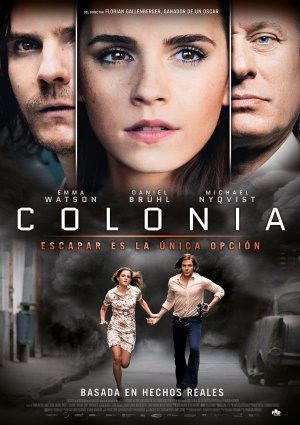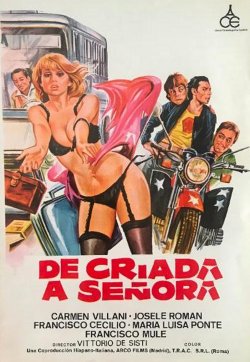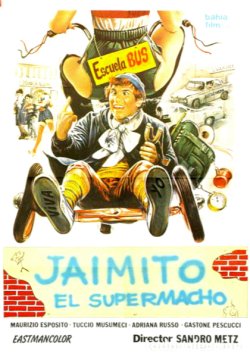 |
|
SINOPSIS
Lena y Daniel se encuentran en Chile justo en el momento del golpe militar en 1973. Daniel es llevado por la policía secreta de Pinochet y Lena lo sigue hasta un lugar denominado "Colonia dignidad". El lugar es una misión de caridad que está a cargo de un predicador laico pero de ese sitio jamás ha escapado nadie. Lena decide unirse al culto del predicador con tal de encontrar a su amado...
INTÉRPRETES
EMMA WATSON, DANIEL BRÜHL, MICHAEL NYQVIST, RICHENDA CAREY, VICKY KRIEPS, JEANNE WERNER, JULIAN OVENDEN, AUGUST ZIRNER, MARTIN WUTTKE, NICOLÁS BARSOFF
MÁS INFORMACIÓN DE INTERÉS
![]() BSO
BSO
![]() CÓMO SE HIZO
CÓMO SE HIZO
![]() VIDEO ENTREVISTAS
VIDEO ENTREVISTAS
![]() AUDIOS
AUDIOS
![]() PREMIERE
PREMIERE
 GALERÍA DE FOTOS
GALERÍA DE FOTOS
https://www.cineymax.es/estrenos/fichas/102-c/101691-colonia-2015#sigProIdb550e50e9f
 INFORMACIÓN EXCLUSIVA
INFORMACIÓN EXCLUSIVA
"All fans of movie classics admire the great thrillers of the 70’s," producer Benjamin Herrmann explains.
“THREE DAYS OF CONDOR and ALL THE PRESIDENT’S MEN were two of those films, delivering a serious message through entertainment and suspense. 40 years later, the combination of thrill and message appeared again in ARGO and THE IMITATION GAME, fine examples of modern thrillers, which take the audience seriously and attract them at the same time. We have the same goal with COLONIA.”
The so called Colonia Dignidad was founded 1961 by German lay preacher Paul Schäfer and his followers, a hermetically sealed-off camp 200 miles south of Santiago de Chile. Schäfer reigned the isolated hamlet for almost four decades. All inhabitants were captives in his dictatorial state-within-astate and lived according to Schäfer's autocratic rules. Originally built as a "German model village" and disguised as charity for Chile's rural population, it became one of the largest farms in Chile. Over four decades, only a few people managed to escape from Colonia Dignidad as most of escapees were picked up and brought back to Colonia with the support by the German Embassy, which closely collaborated with Paul Schäfer.
When General Augusto Pinochet came to power in 1973, however, an even darker chapter began. Due to his close ties to Pinochet's secret service DINA, Schäfer allowed the government to use Colonia Dignidad as a torture camp for political prisoners. He produced and dealed with weapons and poison gas for the Chilean government and even tried to enrich uranium. Initial media reports about Colonia Dignidad shocked the world in the late 70’s, but they did not have any consequences in Chile. Only when Pinochet abdicated in 1990 did law enforcement agencies pursue the accusations against Paul Schäfer. He fled to Argentina, where he was eventually arrested in 2004 and was sentenced by the Chilean courts to 33 years imprisonment on thousands of counts of sexual abuse of children and other crimes. He died in prison in Santiago in 2010. The former members of the Colonia Dignidad stayed and took over the property. It was renamed Villa Baviera.
"I was a student at elementary school,” director Florian Gallenberger remembers, “when I heard about that place in Chile, where people couldn't run away and lived like prisoners. It really shocked me.”
While his historical drama JOHN RABE was in post-production, Gallenberger read the autobiographical book by a former "Colono", how the people living in the Colonia Dignidad were called. Just a few weeks later, screenwriter Torsten Wenzel sent him his idea for a film. This coincidence turned out to be the beginning of COLONIA.
Gallenberger travelled to Chile and researched the story of Colonia Dignidad. "The more time I spent studying the historical facts and hearing people’s stories, the more I wanted to learn about Schäfer's microcosm," Gallenberger said. "I wanted to tell the story of a couple who become members of this ‘community’ by chance and who try to escape." Producer Benjamin Herrmann added: "We didn’t want to make a film just about the facts--the machinations of the CIA, German government, and the Pinochet regime. We wanted to focus on Colonia Dignidad, this state within a state. This adds a great intensity to the story of our main characters."
After several trips to Chile and many encounters with former “residents” of Colonia Dignidad, Gallenberger earned their trust, and their opening up about their lives gave him unprecedented insight into the organization of the sect. "Although our two main characters are fictitious, each detail of the film is historically confirmed, even some of the dialogue with Paul Schäfer are authentic," Gallenberger explained.
This faithfulness to the real events and personalities impressed the film’s cast and crew. Emma Watson, in the lead role of Lena, notes, "The fact that it’s this outstandingly dynamic thriller with true historical material is what makes this film so appealing."
Gallenberger wrote the male leading role with Daniel Brühl on his mind: "Brühl brings the right mix of sensitivity, openness and masculinity.” The two men worked together on JOHN RABE and have been close friends for many years. "When we presented our project at the Cannes Film Festival in 2014, potential financial supporters were so excited by the script, that we were able to start shooting in just 4 months," producer Herrmann continues.
The COLONIA team wanted a strong female hero and Emma Watson’s interest in the part was a dream come true. "I was looking for an actress with a bright aura and a luminous presence. This is just what Emma Watson is," Gallenberger said. "I think the main reason, why Emma joined our team is her interest in politics. She was committed to learning about Colonia Dignidad from the beginning. Plus, it was important to her to play a woman who takes matters into her own hands and does not fear any challenges. Her character risks everything to achieve what is important. In her off-screen life, Emma is the same.” Gallenberger said. Emma Watson described her view: "The interesting dynamic is that we are all familiar with the conventional narrative, in which the woman plays the damsel in distress and the man plays the knight-in- shining-armour who comes to rescue her. In COLONIA, the switch is that actually it’s Lena who goes and rescues her man, and I thought that was really, really beautiful actually - and something we don’t see often in films."
"When Emma and Daniel met in London, we felt within seconds that the chemistry was right and we had found our couple,” Benjamin Herrmann summarizes.
Finding the perfect actor for the third leading role, Paul Schäfer, proved to be much harder. "Many actors were actually hesitant to play this role," Herrmann said. Swedish actor Michael Nyqvist, who became a household name thanks to his starring role in the "Millennium” trilogy, was an early favourite, but he was committed to other projects. "But having him was so critical to the film’s dynamic that we re-scheduled his shooting days to enable him to play the part. Having him was a gift for us!" Herrmann said. "His first day in front of the camera was at the beginning of our third week of shooting," Gallenberger said. "It wasn't easy to start filming without ever having seen the antagonist, but when Michael Nyqvist appeared on the set, everything was clear immediately. His incredible physical presence was made more ominous by our great makeup artist Waldemar Pokromski, who transformed him into a Paul Schäfer lookalike--it was fascinating. Michael was not afraid to play a character that is oppressive and repulsive. We were all impressed by his performance."
Indeed, COLONIA presents Paul Schäfer as a horrifying man but one who believes in what he’s doing. "You have to look into your own abyss in order to perform the character of a villain," Nyqvist adds.
The rest of the cast came from four countries and two continents: Richenda Carey as Colonia Dignidad's supervisor Gisela, Vicky Krieps and Jeanne Werner as female "Colonos," August Zirner as the German ambassador to Chile, Martin Wuttke as head of the Amnesty International office in Santiago de Chile, César Bordón as the feared DINA chief Contreras, and Nicolás Barsoff as the leader of a resistance group.
"It was fascinating to see how the team adapts to shooting in different locations and later put the puzzle together in the editing room," Benjamin Herrmann said. "In Luxembourg, our set designer, Bernd Lepel, recreated the grounds of Colonia Dignidad in an abandoned slate mine." Emma Watson adds: "I remember the first time I saw the set. I was just speechless, really. It’s an exact replica, measure for measure--every room, every space, is identical. I was blown away. It was creepy and kind of odd, having just been at the Colonia camp in Chile quite recently before."
Other scenes were filmed in the fields outside of Luxembourg while the extensive “Casemates” under the capital city served as the tunnel system under Colonia Dignidad. In order to shoot the scenes in a flooded tunnel, the filmmakers closed the indoor swimming pool in Berlin-Tiergarten for one week.
Filming on location in Villa Baviera, the former Colonia Dignidad, was not possible, for humanitarian reasons. Other places in Chile, such as Santiago’s Estadio Nacional, the detention centre for the roundups of prisoners during the 1973 coup, were unfortunately impossible since the stadium has been modernized. After location scouts found the right place to shoot these iconic scenes in the centre of Buenos Aires, production decided to locate all outdoor scenes of the street fights there. All interiors of Colonia Dignidad, including the halls, the dormitories and the hospital, as well as the interiors of the German embassy, were filmed in or around Munich.
"It was a challenge for the entire cast and crew to work in many different locations. But it’s inspiring to see how these tiny pieces result in one great film," Benjamin Herrmann said. "To make things even harder, we had a very limited number of shooting days,” Florian Gallenberger said. "Looking back, it was incredible how hard each department worked on this project.”
The unity of visual image that resulted came substantially from Kolja Brandt's camera work. He defined different visual worlds by using different equipment and techniques. For the scenes playing in Chile in 1973, for instance, Brandt used a special set of optics from the 1970’s. "They created a certain fuzziness and softness," Gallenberger explained. "In contrast, all scenes in Colonia Dignidad have a sharp and brilliant appearance, and the camera is close to the characters and their predicament. Kolja's images convey a feeling of continual anxiety and narrowness, of being confined.”
Editor Hansjörg Weissbrich put the puzzle together. "Hansjörg recognizes the importance of each part, and it was tremendous fun to find the internal rhythm of each scene and of the whole film," Gallenberger said.
The last important component was the music. Three iconic songs were used to establish the love story between Lena and Daniel and to set the mood of the 70’s: Janis Joplin's "Try (Just A Little Bit Harder)", "Samba Pa Ti" by Carlos Santana, and "Ain’t No Sunshine" by Bill Withers (which also appears as a cover version on the film’s end credits, performed by Danish-German shooting star Jesper Munk). In addition, Gallenberger and Herrmann felt that the arrangements by French composer André Dziezuk and Spanish composer Fernando Velázquez captured the moods--the hardship, tensions, and courage--of the story. Dziezuk and Velázquez's emotional score draws viewers into the film’s many moods. Gallenberger swarms, "Fernando's compositions are the icing on the cake. They mark the final step, after five years of work."










